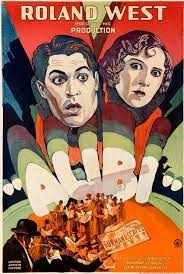
ALIBI
US, 1929, 90 minutes, Black-and-white.
Chester Morris, Harry Stubbs, Regis Toomey, Mae Busch, Eleanor Griffith, Irma Harrison, Purnell Pratt, Pat O'Malley.
Directed by Roland West.
Alibi is a piece of American cinema history.
Released in 1929, there was also a silent version but this is an early talking. It is readily available on YouTube.
It received Oscar nominations in the early years of the Academy Awards, the best film, for Best Actor for Chester Morris, Best Set Design for veteran William Cameron Menzies.
For many this will be just a curio, a very early gangster film, proceeding the classics of the 1930s. It has a familiar plot, a prohibition gangster release from prison, teaming up with his old connections, organising a robbery from a garment warehouse, shooting a policeman, creating an alibi where he was at the theatre with his wife, the daughter of a police chief, but slipping out during the interval, the tickets providing the alibi.
There are a emotional conflicts, the daughter of the policeman friendly with both the gangster and another policeman, marrying the gangster without realising his evil intent, rejecting her longtime friend, another policeman.
A lot of the action takes place in a nightclub, there are frequent sequences of the dancing of the chorus line. In this context there is an undercover policeman, played by Regis Toomey, friendly with the girls, insinuating himself with the criminals, being used to provide information for the alibi, but the wife also wanting to telephone the police, the criminal is realising that they were being doublecrossed, the confrontation and a very long and emotional deaths scene for Regis Toomey.
There is a range of criminals, a boorish old-timer with business connections imposing on his long-suffering wife. And there is a chorus girl in love with the undercover policeman.
Ultimately, there is a confrontation, cowardly behaviour by the criminal, his being shot with blanks and fainting, and his being taken away, the police achieving their goals.
For tastes in the succeeding decades, even during the 1930s, this film will have seemed very old-fashioned. However, film students and commentators have a lot to say about the talent of the writer-director, Roland West, and his cinematic techniques.